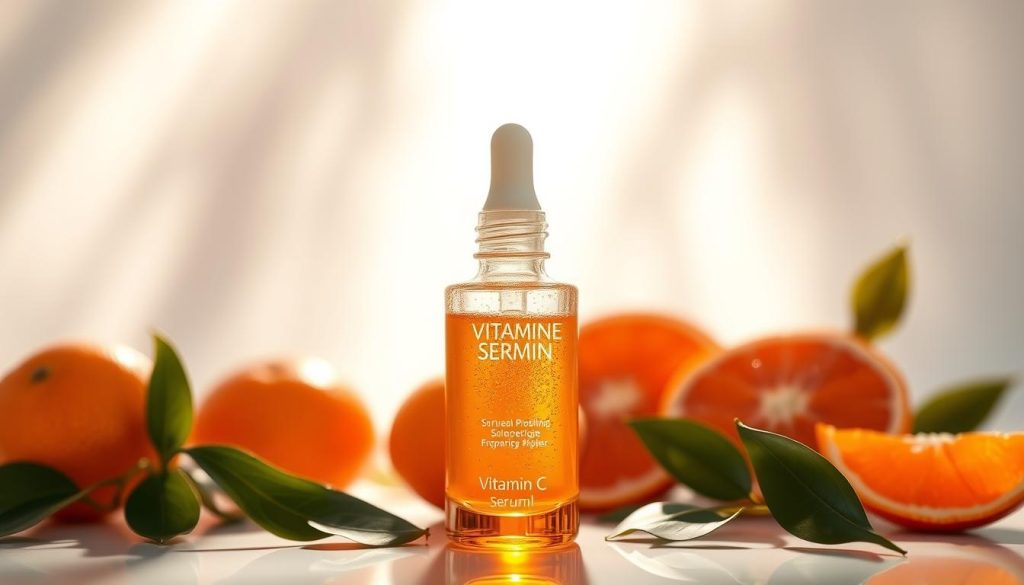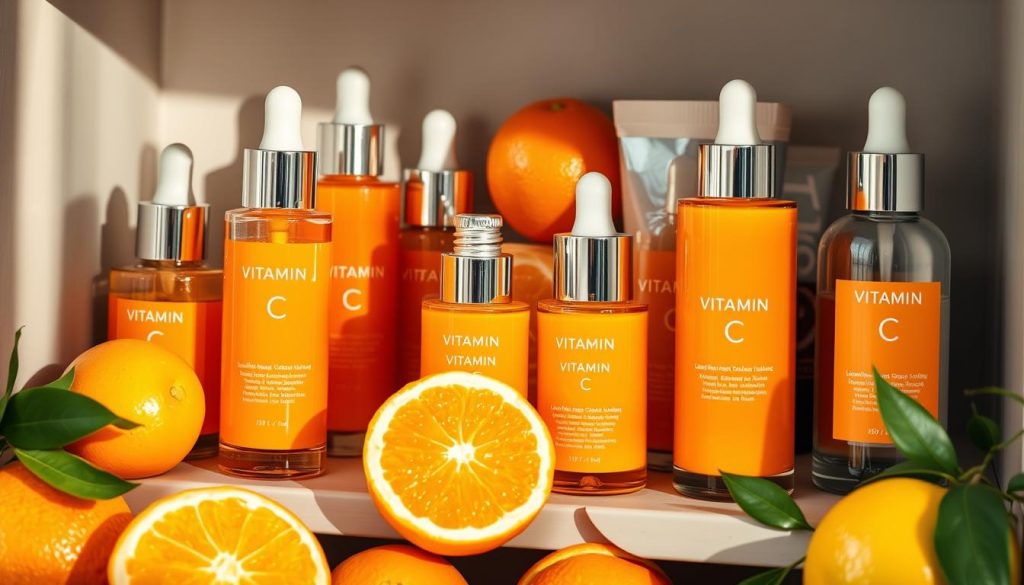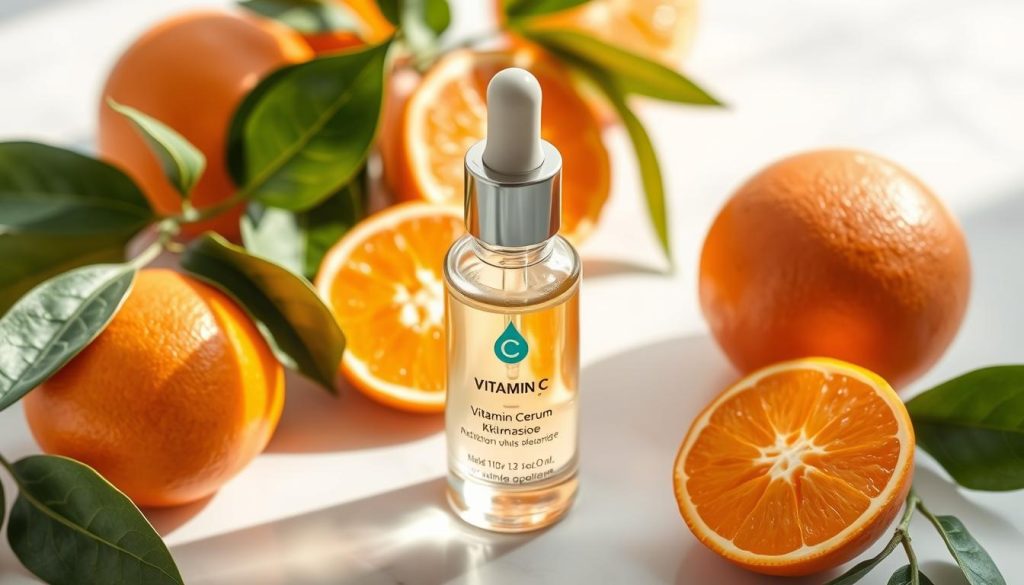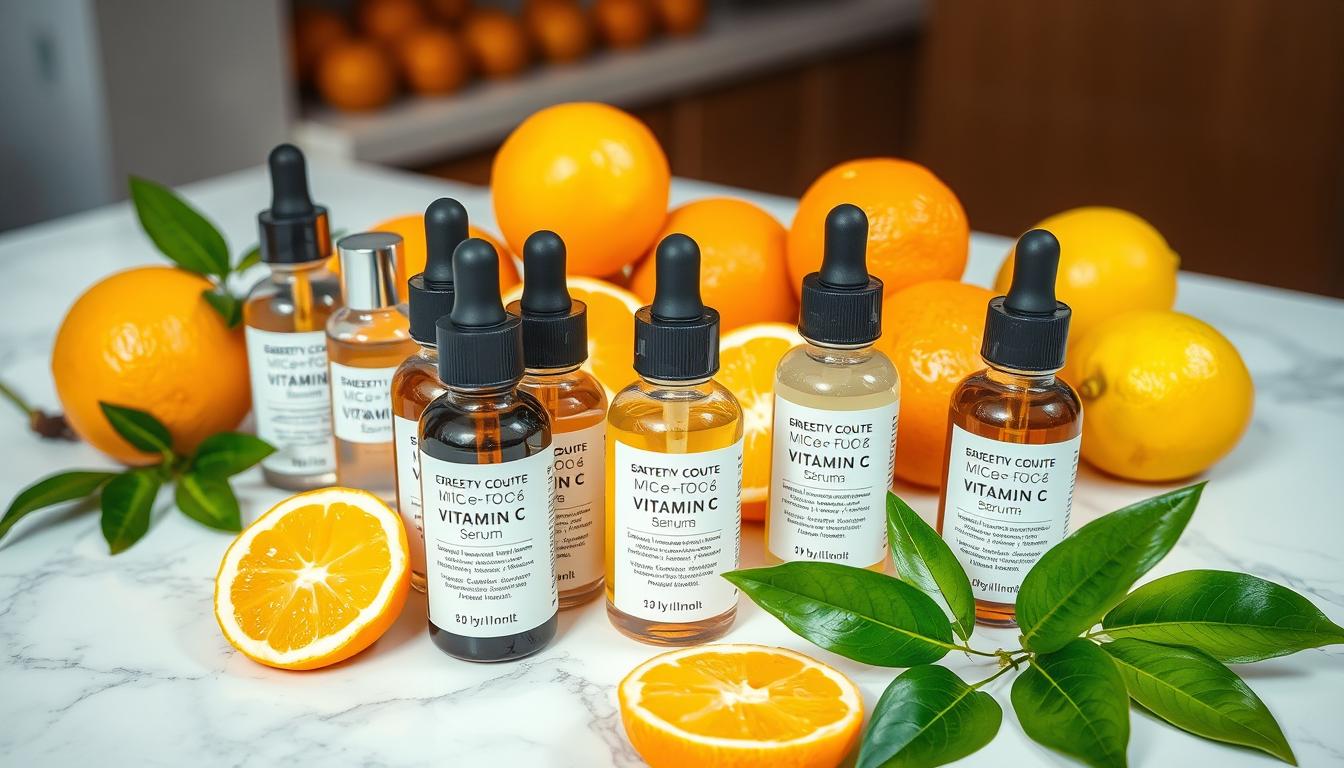I’m excited to share my knowledge about Vitamin C serums and their importance in skincare routines. Vitamin C Skincare has become a staple in many beauty regimens. It offers a wide range of benefits that can transform your skin.
From brightening and smoothing to protecting against environmental stressors, Vitamin C Serums 101 is the perfect place to start your skincare journey.
In this comprehensive guide, I’ll dive into the world of Vitamin C Skincare. We’ll cover everything from the basics to advanced tips and tricks. Whether you’re a skincare newbie or a seasoned pro, you’ll find valuable information to help you get the most out of your Vitamin C serums.
So, let’s get started and explore the wonderful world of Vitamin C Serums 101!
What Is Vitamin C Serum and Why Should You Use It?
Vitamin C serum is a key part of many skincare routines. It’s packed with nutrients that boost your skin’s look. It gives your skin the care it needs.
Understanding Vitamin C in Skincare
Vitamin C is a strong antioxidant. It protects your skin from harm. When used as a Vitamin C Serum for Face, it goes deep into your skin. This helps keep your skin healthy.
The Science Behind Vitamin C’s Effectiveness
Vitamin C helps make collagen, which keeps your skin elastic. It also helps even out your skin tone. This makes it a smart choice for your skincare.
Key Benefits for Your Skin
- Antioxidant Protection: Keeps your skin safe from the outside world.
- Collagen Production: Makes your skin firmer and reduces wrinkles.
- Brightening Effects: Makes your skin tone better and fades dark spots.
Adding a Vitamin C Serum for Face to your daily care can really make a difference. It’s a smart choice for glowing, healthy skin.

Vitamin C Serums 101: Best Products, Benefits, Side Effects, and More
Exploring Vitamin C Serums 101 opens up a world of glowing skin and enhanced protection. I’ve tried several top-rated products, and here are my favorites:
- SkinCeuticals C E Ferulic – Known for its potent antioxidant blend.
- TruSkin Vitamin C Serum – A budget-friendly option with natural ingredients.
- Drunk Elephant C-Firma Day Serum – Offers a firming effect alongside vitamin C benefits.
The benefits of using Vitamin C serum are impressive. They include boosting collagen production, reducing dark spots, and protecting against environmental damage. Regular use can lead to a brighter complexion and smoother skin texture.
But, it’s important to know about Vitamin C Serum Side Effects. Some users may experience mild irritation or redness, mainly if they have sensitive skin. To minimize these effects, start with a lower concentration and gradually increase usage.
Overall, adding a Vitamin C serum to your skincare routine can make a big difference. Just make sure to pick a product that fits your skin type and follow the application guidelines. This way, you can enjoy all the benefits while avoiding any potential drawbacks.

Different Types of Vitamin C in Skincare Products
Exploring Vitamin C Skincare options means knowing the different Vitamin C forms. Each form has its own benefits and meets different skin needs.

L-Ascorbic Acid vs. Derivatives
L-Ascorbic Acid is the purest Vitamin C, great for brightening and protecting the skin. But, it can be unstable and might irritate sensitive skin. Derivatives like Sodium Ascorbyl Phosphate and Magnesium Ascorbyl Phosphate have similar benefits. They are more stable and gentler, making them good for more skin types.
Stability and Formulation Differences
Vitamin C Serum Ingredients have different stabilities. Pure L-Ascorbic Acid needs airtight, opaque packaging to stay effective. Derivatives are more stable and can be packaged less strictly. This makes them last longer and allows for more flexible product designs.
Which Form Is Right for Your Skin Type
Choosing the right Vitamin C form depends on your skin type and concerns. For oily or acne-prone skin, stable derivatives like Sodium Ascorbyl Phosphate are best. If you have dry or normal skin and can handle strong ingredients, L-Ascorbic Acid might be better. Always think about your skin’s sensitivity and talk to a dermatologist if you’re unsure.
| Vitamin C Form | Stability | Best For |
|---|---|---|
| L-Ascorbic Acid | Less stable, requires careful packaging | Normal to dry, non-sensitive skin |
| Sodium Ascorbyl Phosphate | More stable, suitable for various formulations | Oily or acne-prone skin |
| Magnesium Ascorbyl Phosphate | Stable, better for sensitive skin | Sensitive or combination skin |
My Top Recommended Vitamin C Serums for Every Skin Type
Finding the best Vitamin C serums can change your skincare game. No matter your skin type, there’s a perfect match for you.

- Sensitive Skin: CeraVe Vitamin C Serum – Gentle and effective, ideal for sensitive types.
- Oily Skin: La Roche-Posay Pure Vitamin C Face Serum – Lightweight formula that won’t clog pores.
- Dry Skin: Vichy LiftActiv Vitamin C Serum – Hydrating properties to nourish dry skin.
- Combination Skin: Skinceuticals C E Ferulic – Balances different skin areas effectively.
- Budget-Friendly: The Ordinary Vitamin C Suspension – Affordable and highly rated.
- Luxury Choice: Sunday Riley C.E.O. 15% Vitamin C Brightening Serum – Premium ingredients for radiant skin.
| Skin Type | Product | Price Range | Key Benefits |
|---|---|---|---|
| Sensitive | CeraVe Vitamin C Serum | $$ | Gentle on skin, soothing ingredients |
| Oily | La Roche-Posay Pure Vitamin C Face Serum | $$$ | Non-comedogenic, oil-control |
| Dry | Vichy LiftActiv Vitamin C Serum | $$$ | Hydrating, enhances moisture retention |
| Combination | Skinceuticals C E Ferulic | $$$$ | Balances skin, powerful antioxidants |
| Budget-Friendly | The Ordinary Vitamin C Suspension | $ | Affordable, effective concentration |
| Luxury | Sunday Riley C.E.O. 15% Vitamin C Serum | $$$$$ | High-end ingredients, luxurious feel |
How to Choose the Right Vitamin C Concentration
Choosing the right Vitamin C Serum for Face starts with knowing the best concentration for your skin. The right amount ensures benefits without irritation.
Beginner Concentrations (5-10%)
For those new to vitamin C serums, a 5-10% concentration is best. These Vitamin C Serum Ingredients gently brighten and improve skin texture. They are safe for sensitive skin.
Intermediate Strengths (15-20%)
If your skin is used to vitamin C, try 15-20% for more benefits. This level offers better antioxidant protection and collagen support. It’s great for those who use vitamin C regularly.
Professional Grade Options (20%+)
For those looking for the strongest results, go above 20%. These formulas provide maximum brightness and anti-aging effects. Use them with caution and under professional advice to avoid irritation.

| Concentration | Benefits | Best For |
|---|---|---|
| 5-10% | Gentle brightening, improved texture | Sensitive or first-time users |
| 15-20% | Enhanced brightness, firmness, collagen support | Regular users looking for stronger effects |
| 20%+ | Maximum brightness, advanced anti-aging | Experienced users, professional settings |
Common Side Effects and How to Avoid Them
While Vitamin C skincare has many benefits, it’s key to know about possible Vitamin C serum side effects. Some people might get irritation, redness, or dryness when they start using Vitamin C serums.
- Start Slow: Begin with a lower concentration of Vitamin C and gradually increase as your skin builds tolerance.
- Patch Test: Apply a small amount of serum on a discreet area to check for any adverse reactions before full application.
- Moisturize: Use a good moisturizer to help maintain your skin’s hydration and reduce dryness.
- Limit Frequency: If you notice irritation, reduce the number of applications per week.
Here’s a quick reference table to help you navigate common side effects and their solutions:
| Side Effect | How to Avoid |
|---|---|
| Irritation | Start with a lower concentration and perform a patch test. |
| Redness | Limit usage frequency and ensure proper moisturizing. |
| Dryness | Use a hydrating moisturizer alongside your Vitamin C serum. |
Best Practices for Storing Your Vitamin C Serum
It’s important to keep your Vitamin C Serums 101 in top shape. This ensures the Vitamin C Serum Ingredients stay effective for your skin.
Temperature and Light Considerations
Store your serum in a cool, dark spot. High temperatures and sunlight can break down the active ingredients.
- Keep it in a cool area, away from heat sources.
- Avoid placing it near windows where sunlight streams in.
Packaging Requirements
The right packaging is key to keeping your serum strong. Look for containers that block light and air.
- Select opaque or UV-protective bottles.
- Opt for airless pumps to minimize contact with air.
Signs Your Serum Has Gone Bad
Knowing when your serum has gone bad is important.
- Discoloration or darkening of the serum.
- Unpleasant or off odors.
- Changes in texture or separation.
| Storage Tips | Signs of Spoilage |
|---|---|
| Keep in a cool area | Discoloration |
| Use dark bottles | Unpleasant odor |
| Choose airless pumps | Texture changes |
How to Layer Vitamin C Serum with Other Products
Adding a Vitamin C Serum to your skincare routine can greatly improve your skin. It’s key to layer it right with other products to get the most out of it.
- Cleansing: Begin with a gentle cleanser to clear your skin without drying it out.
- Toning: Use a toner to adjust your skin’s pH and make it ready for other products.
- Vitamin C Serum for Face: Put a few drops of Vitamin C Serum on your face and neck, rubbing it in gently.
- Moisturizing: Next, apply a moisturizer to keep your skin hydrated and boost the serum’s effects.
- Sunscreen: In the morning, end with a broad-spectrum sunscreen to shield your skin from UV rays.
When using Vitamin C Skincare, don’t mix it with products that have lots of retinol or other strong ingredients. This can irritate your skin. Instead, use them one at a time or at different times of day.
Here’s a quick reference table to help you optimize your skincare layering:
| Step | Product | Application Time | Waiting Time |
|---|---|---|---|
| 1 | Cleansing | Morning & Night | N/A |
| 2 | Toner | Morning & Night | 30 seconds |
| 3 | Vitamin C Serum for Face | Morning | 1 minute |
| 4 | Moisturizer | Morning & Night | 30 seconds |
| 5 | Sunscreen | Morning | 1 minute |
Morning vs. Night Application: What’s Better?
When to apply your Vitamin C serum is key to getting the most out of it. Let’s explore the benefits of using Vitamin C Serums 101 in the morning and at night.
Benefits of AM Application
- Provides antioxidant protection against daily environmental stressors.
- Enhances sun protection when combined with sunscreen.
- Prepares your skin for makeup application with a smooth base.
Benefits of PM Application
- Supports skin repair and regeneration overnight.
- Maximizes the Vitamin C Serum Benefits by allowing deeper absorption.
- Reduces the appearance of fine lines and wrinkles while you sleep.
My Personal Recommendations
From my experience, applying Vitamin C serum in the morning is great for protecting against environmental damage. It also works well with sunscreen. On the other hand, using it at night helps with skin repair and absorption.
For the best results, you might want to use Vitamin C Serums 101 both in the morning and at night.
| Application Time | Benefits |
|---|---|
| Morning |
|
| Night |
|
What to Expect: Timeline for Visible Results
When I started using vitamin C serum, I was excited to see my skin’s response. In the first few weeks, my skin looked brighter and felt smoother. The Vitamin C Serum Benefits were clear right away, with a subtle glow that made my skin shine.
After two months of regular use, the effects became more obvious. Fine lines around my eyes and mouth were less visible. My skin tone became more even. The Vitamin C Serum Reviews I read before using it matched my experience.
Several things affected how fast I saw results. Applying it regularly, choosing the right concentration for my skin, and sticking to a skincare routine were key. Remember, everyone’s skin is different. Your results might take longer. But being patient and consistent is crucial to see vitamin C serum’s full benefits.
Conclusion: Making Vitamin C Serum Work for You
Adding a Vitamin C serum to your skincare routine can change your skin’s health and look. This guide on Vitamin C Serums 101 has covered the science behind their benefits. It also showed some of the best Vitamin C serums out there.
Choosing the right serum means knowing the different types and strengths for your skin. Whether you’re new to it or looking for top-quality options, there’s something for everyone.
Keep your serum in a cool, dark place to keep it strong. Also, avoid common side effects by following the best practices we talked about. Layering your Vitamin C serum with other products and deciding when to use it can make your skincare better.
Being consistent is crucial for seeing real results. Let your skin get used to the serum. Don’t be afraid to try different products and strengths to find what works best for you.
By making smart choices and sticking to your routine, Vitamin C serums can be a big help in getting healthy, glowing skin.
